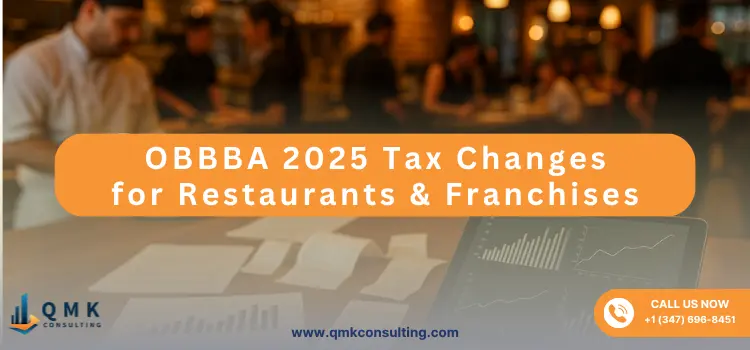
October 13, 2025 |Tax Preparation Services


If you own a restaurant, a growing franchise, or a multi-location concept, 2025 brought more than headlines—it brought real, operational tax changes that hit payroll, purchasing, pricing, and cash flow.
Below is your guide to the One Big Beautiful Bill Act (OBBBA) and what to do next. We’ll translate law into decisions, with a bias toward the day-to-day of hospitality.
Quick context: OBBBA became law on July 4, 2025, with IRS guidance rolling out since then. We’ve linked credible sources throughout so you can verify specifics.
OBBBA reinstates the old 1099-K standard for third-party platforms (PayPal, Venmo Business, Etsy, eBay, DoorDash payouts, etc.): you’ll generally receive a 1099-K only if you exceed $20,000 in payments and 200 transactions on a single platform.
For tax year 2025 activity (forms issued in early 2026), that means far fewer surprise forms for casual or low-volume sellers. Card processors still report card payments with no dollar threshold. None of this changes the rule that all income is taxable.
What to do now:
For practical accounting workflows, see our internal guides on COGS for Restaurants and Restaurant Financial Statements.
Despite the nickname, this is not a full exemption. Under OBBBA, eligible workers in listed tip-based occupations can deduct up to $25,000 of qualified tips on their federal return for tax years 2025–2028 (subject to phase-outs and other conditions). Tips remain subject to payroll taxes (Social Security/Medicare) and state/local taxes where applicable. The IRS has proposed detailed definitions of “qualified tips” and published an extensive list of occupations. Expect ongoing procedural guidance.
Owner action items:
For 2025–2028, individuals may deduct the overtime “half” portion of time-and-a-half (subject to caps and rules). This is designed to soften the tax impact for workers logging long shifts—relevant to restaurants managing seasonal spikes or late-night service. Employers should ensure payroll reporting can distinguish regular vs. overtime components for accurate year-end statements.
One of the most business-critical provisions: OBBBA restores 100% bonus depreciation for qualified property acquired and placed in service after Jan. 19, 2025. For your first tax year that ends after Jan. 19, 2025, you may elect 40% instead of 100%—a strategic lever if you want to smooth taxable income. This is powerful for equipment refreshes, kitchen line upgrades, tech stacks (POS, tablets, back-office servers), and remodel cycles.
Planning lens:
OBBBA boosts the standard deduction in 2025 to approximately $31,500 (MFJ), $15,750 (Single/MFS), and $23,625 (HOH), with further inflation adjustments slated for 2026. Practically, more of your W-2/flow-through income may be shielded before higher brackets bite—use this headroom to time bonus payouts, owner draws, or conversion of distributions.
For 2025, the IRS business mileage rate is 70¢/mile. Keep accountable plans tight—especially for multi-unit operators reimbursing area managers. For travel, GSA’s FY 2025 per-diem raised the standard CONUS lodging rate to $110 and increased M&IE tiers (useful reference for policy updates and audit defense).
Menu engineering & pricing. With 100% bonus back, consider bringing forward kitchen equipment or automation that reduces labor minutes per plate. Model the tax shield alongside throughput gains before year-end.
Workforce messaging. The tips and overtime deductions are great employee talking points, but they are return-level deductions, not pay-stub tax holidays. Set expectations early to prevent confusion during hiring and reviews.
Channel hygiene. Even with the 1099-K rules relaxing for platforms, you still need clean gross-to-net tie-outs across Toast/Square/Stripe/Shopify/Uber Eats/DoorDash. Fewer forms ≠ fewer records. Keep monthly reconciliations non-negotiable.
Capex game plan. If a remodel or multi-unit refresh is on your roadmap, re-run the ROI with bonus depreciation at 100%. The optional 40% election can be a useful throttle if 100% would overshoot your target taxable income in the transition year.
For deeper tactical help, see:
QMK Consulting is an accounting firm in New York City specializing in franchise accounting and restaurant accounting. We build the month-end engine that powers clean books and smarter decisions: airtight reconciliations, payroll/tips compliance, equipment ROI modeling, and capex timing that actually serves your unit economics—not just your tax bill. Then we turn that data into strategy: pricing, menu mix, labor productivity, breakeven by daypart, and cash flow sequencing for growth.
Explore related resources on our blog:
Want a tailored walkthrough of OBBBA 2025 impacts on your locations—plus a plan to capture tax savings without breaking operations? Book a free Profit & Cash Flow Analysis with Mohamed Karmous, Franchise Accounting Expert and Restaurant Accounting Advisor at QMK Consulting. Our NYC-based team will benchmark your numbers, map out reconciliation fixes, and prioritize quick wins to protect profit and cash.
👉 Get your free analysis by our experts—and turn policy changes into measurable margin.